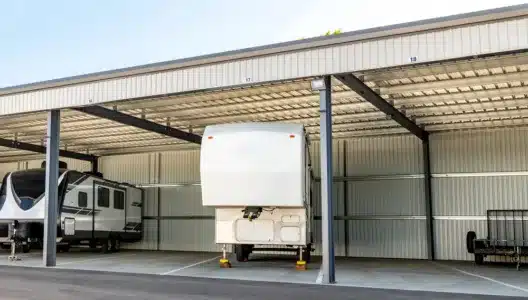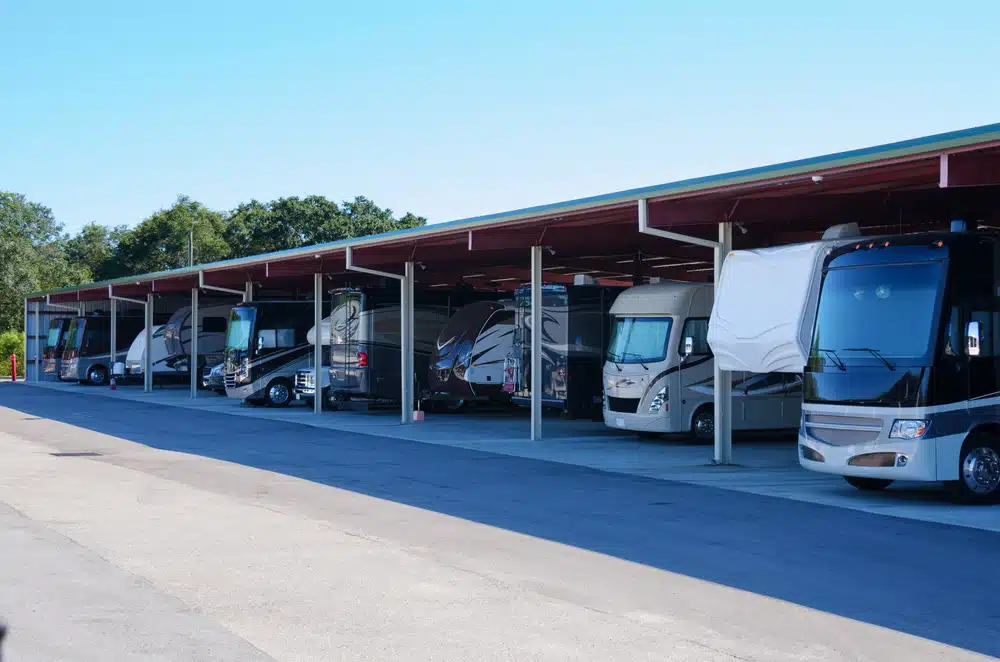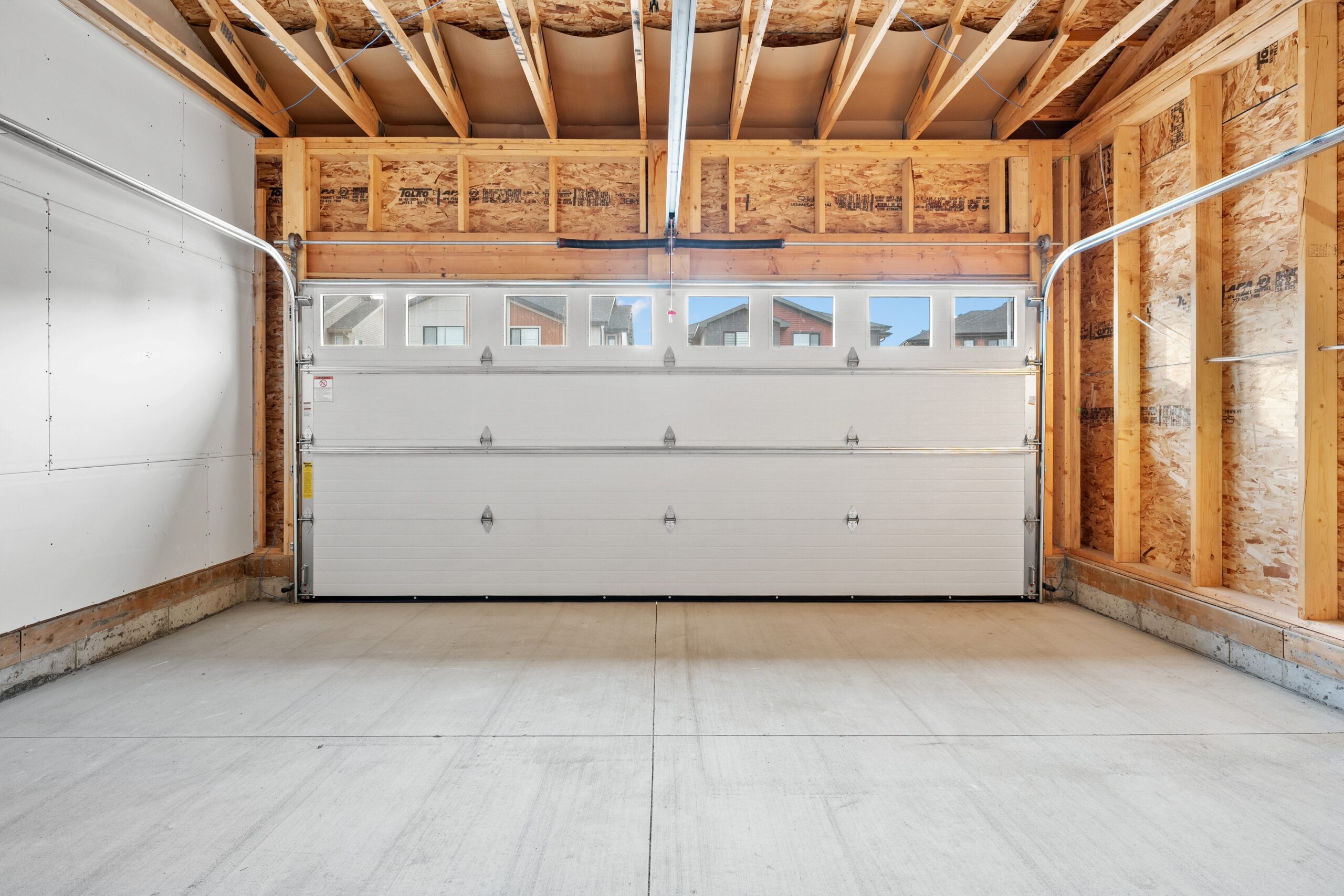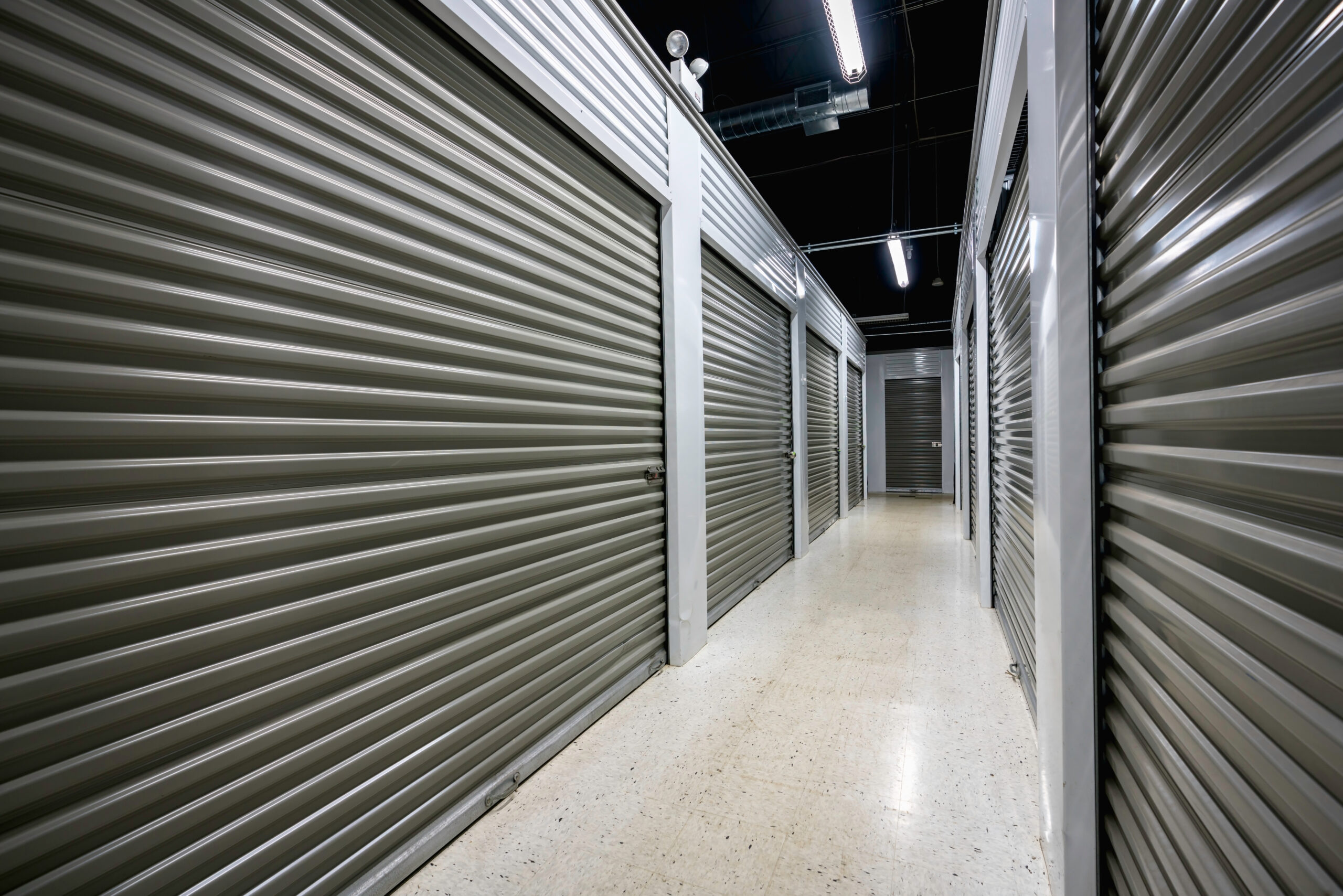Maybe you’re a veteran RV owner looking to store your camper for an extended period of time.
Maybe you need a weekday storage space to keep your cozy camper between weekend getaways.
Or maybe you only go out and about during the warmer months, and you’re here looking for seasonal storage options. Either way, you’ve come to the right place.
Whether you need short-term or long-term RV storage, and whether you need an outdoor parking space, enclosed storage, or an indoor vehicle storage unit, our guide covers the details of where to store an RV.
We’ll cover the pros and cons of at-home storage. We’ll compare the benefits and drawbacks of outdoor storage facilities, indoor storage units, uncovered storage, and covered storage options.
Regardless of the RV storage choice you go with, there are methods to protect your investment and prepare for next year’s adventures.
To make the process of choosing the right storage space for your recreational vehicle stress-free, we’ve created a quick guide to help you weigh the pros and cons of all these RV storage solutions.
Storing Your RV at Home

When it comes to camper storage ideas, keeping your RV, pop-up, or trailer on your own property (indoors or outdoors) seems like the ideal. IAt-home storage might seem like the easy answer to the question of where to store an RV – it’s a free and easy option, maybe even the first one that pops to mind. But do you have enough room in your garage for an RV?
And if not, does your neighborhood allow recreational vehicles in the driveway or backyard if not? Let’s see what each of these home RV storage solutions entails.
Garage RV Storage
A standard garage measures 22 to 24 feet deep, which is enough to fit campers and trailers that are on the small side, typically class B, which runs between 16-21 ft. If the RV you need to store is larger than this, storing it in your garage may be out of the question.
Pros of storing your RV in your garage:
- Cost-effective — Storing an RV at your own home avoids any storage fees.
- Protecting RVs from weather — As an indoor storage option, your garage protects it from damage caused by all sorts of adverse weather conditions, saving you money on repairs later.
- Secure storage solution— Indoor RV storage of any type also protects your RV from theft and vandalism, especially in the garage of a modern home with enhanced security systems.
Cons of storing your RV in your garage:
- Space limitations — The RV takes up your garage’s extra storage space. Garages are a great place to keep things you use more often, such as a snow blower, shovels, lawn mower, bike, or another car.
- Potential pest issues — Bugs and other unwanted pests can find their way into your garage, and you can bet those critters will also want in your RV.
- Lack of climate control — While your garage protects your RV from hail, snow, and rain, it won’t protect it from the wear that extreme fluctuations in temperature can cause.
Driveway Storage or Backyard Storage
Driveway storage and backyard storage are both tempting long-term RV parking spots. However, it is still important to weigh the pros and cons. To combat the elements that can damage your RV, camper, or trailer, you may need to invest in a carport or cheap RV storage cover.
Pros of storing your RV in your backyard or driveway:
- Convenient — Basic maintenance tasks and last-minute road trips are much easier to pull off when the RV is right there on your property.
- Relatively inexpensive — Storing an RV in private outdoor spaces like your driveway or backyard doesn’t cost you anything in storage fees, but you’ll have to invest in extra protection measures instead.
Cons of storing your RV in your backyard or driveway:
- Exposed to weather — Uncovered spaces like driveways and backyards expose your RV to extreme weather conditions that can cause damage and add additional costs in repairs. RV covers provide an extra layer of protection and typically start around $200 — the price can greatly increase based on the size of your vehicle. While more affordable options like RV tarps are available, the cheaper ones aren’t breathable and can do more harm than good.
- Possible local restrictions — If you’re storing in an area where homes are close together, your neighbors may consider your recreational vehicle to be an eyesore. •What’s more, your neighborhood or HOA may have rules against parking your RV outside — better check those beforehand.
- Security risks — Parking your RV, camper, or trailer outside leaves it vulnerable to theft and vandalism.
Storing Your RV at a Storage Facility

Our preferred answer to the question of where to store an RV is to take advantage of offsite storage. Overall, the greatest benefit of any type of RV storage in a facility will be enhanced security features like cameras and site security personnel.
The three most common types of RV storage in a facility are outdoor parking lots, covered parking spaces, and indoor vehicle storage options.
Open-Air RV Storage
The most common type of storage for RVs is uncovered outdoor storage. Outdoor RV storage entails parking your RV, camper, or trailer in a designated spot on the storage facility’s property. It is typically the most affordable option at any storage facility and is a great solution for short-term storage.
Pros of open-air RV storage options:
- Cost-effective — Outdoor RV storage is a simple storage method and is often the least expensive RV storage option at a storage facility.
- Easy access — Some storage facilities offer 24-hour access using secure electronic gate access, so you get pretty much the same convenience of storing your RV at home.
Cons of open-air RV storage options:
- High exposure to weather — Since your RV will be outside, it is exposed to extreme weather conditions, just like in your driveway or backyard.
- Less secure than enclosed storage options — While the storage parking lot that serves as outdoor storage for RVs is typically located behind a securely fenced area, it lacks the extra layer of protection of an indoor space.
Covered RV Storage
Covered vehicle storage is the most popular method among owners of medium and larger RVs. With covered RV storage, your RV is parked outside under a sheltered area, often a roof or awning. This offers some added protection from unfavorable weather conditions.
Pros of covered RV storage:
- Moderate protection from weather — Covered vehicle storage protects your RV, camper, or trailer under a roof or awning. Covered parking offers additional protection compared to simply parking it in outdoor storage.
- More security features — Covered RV storage is a clear compromise between indoor and outdoor storage.
- More affordable — covered vehicle storage is lower than the average cost of indoor vehicle storage.
Cons of covered RV storage:
- •Exposed to outdoors— While covered storage offers more protection than outdoor RV storage, an awning alone will not completely protect your RV from adverse weather conditions or pests.
Fully Enclosed RV storage
Indoor facilities can be a great option for a camper, trailer, or very small RV (most likely only Class B). Some over-sized units such as the 10×40 can hold RVs up to 40 feet, but they may be tough to find.
Indoor RV storage at a facility will be the most expensive option, but it also offers the most protection. However, it’s not the most common RV storage method people choose because it is hard to come by.
Pros of fully enclosed RV storage units:
- The most secure storage solution — Four walls, a locked door, and a secure facility will protect your RV from theft, vandalism, and harsh weather conditions.
- Climate control — While it comes at a premium, climate-controlled vehicle storage units are a blessing for your RV or camper, reducing the risk of rust and keeping tires in tip-top condition.
Cons of fully enclosed RV storage units:
- The most expensive RV storage option — Indoor vehicle storage comes with high costs, but paying more to store your RV well may save you money on repairs later.
- Limited availability — Indoor RV storage is not that common, so finding it near you may be a challenge. Plus, Class A and Class C RVs are not likely to fit in indoor storage.
Comparing RV Storage Solutions
Now that you’ve absorbed the in-depth answer to where to store an RV, here’s a simplified cheat sheet for camper storage options:
| Storage Type | RV Storage Costs | Accessibility | Security | Weather Protection | Suitability by RV Type |
| Garage Storage | Most cost-effective | Very high (at home) | Very secure | Excellent (indoors) | Small RVs only |
| Driveway or Backyard | Rather inexpensive (requires cover/carport) | Very high (at home) | Low to moderate | Moderate (with cover/carport) | Suitable for any size; local RV storage regulations apply |
| Open-air RV Storage | Least expensive (requires cover) | High (24-hour gate access) | Moderate to high (fenced) | Low (exposed to elements) | Suitable for any size; mostly short-term storage |
| Covered RV Storage | Moderate | Moderate to high | Moderate to high (fenced) | Moderate | Suitable for any size |
| Fully Enclosed RV Storage | Most expensive | Moderate | Highest security | Excellent (especially if climate-controlled) | Depends on availability |
Preparation Checklist for Long-Term RV Storage:
Prep Your RV’s Interior
- Remove all the food, toiletries, cleaning products, and valuables like electronics, documents, and tools.
- Give the inside of your RV a good scrub, hitting those sneaky spots under the cushions and in the cabinets.
- Defrost and clean out the fridge using a bleach solution, and keep the doors open so mold doesn’t creep in.
- Wipe down the floors and surfaces with safe, non-toxic cleaners to keep everything fresh and ready for your next trip.
Prep Your RV’s Exterior
- Wash the exterior from the top down with some RV-friendly cleaners.
- Scrub the awning and make sure it’s nice and dry before rolling it up to keep mildew away.
- Slap on a nice layer of protective wax to keep your RV shiny and protected against oils, dirt, and debris.
- Add some fuel stabilizer and change your RV’s oil.
- Check the tire pressure, inspect them for wear and tear, and give them a good clean; cover your RV tires if you’re storing them outside,
- Set your RV on leveling blocks while ensuring the tires still touch the ground.
Prep your RV’s Systems and Utilities
- Drain all your RV’s water systems, the plumbing, and the water heater tank.
- Winterize your RV by tossing some RV antifreeze into the waste tanks, sinks, drains, and pipes to prevent freezing while it sits.
- Inspect your propane levels and make sure all the valves are closed tight.
- Pop the battery out and clean the terminals; flip your battery disconnect switch if you’ve got one.
- Examine your windows, doors, and roof spots for damaged seals or caulking, and fix any issues before storage.
Prep Your RV Storage Security Measures
- Pick the right place to store your RV; again, we suggest a climate-controlled offsite storage facility with 24-hour security surveillance.
- Slip on a weather-resistant cover that fits your RV.
- Make sure your awning and slide-outs are tucked away in travel mode.
- Grab some wheel locks or locking lug nuts to keep things safe.
- Put locks on the doors, cargo boxes, and hitch.
- For long-term RV storage, remove the license plate.
- Lock up all your propane tanks, generators, and outdoor gear.
Pest Prevention For Long-Term RV Storage
- Block off any pest entry points with some steel wool or spray foam.
- Leave RV-safe pest repellents around vulnerable spaces.
- Toss in some moisture-absorbing gel packs.
- Be sure your RV is completely dry and leak-free before leaving it in long-term storage.
Download your own copy of the Longterm RV Storage Checklist here!
Additional Considerations for Seasonal RV Storage
No matter where you store your RV, take additional steps to ensure its security and perform regular maintenance—especially if you’re relocating with your RV or switching between seasonal homes. Learn more about relocating RVs here.
Here are a few RV and trailer storage tips to guide you:
- Buy robust locks, add security cameras around your driveway, and choose storage facilities with gated access and 24/7 security monitoring.
- Check with your insurance provider to confirm storage coverage specifics — some greatly depend on where you store your RV.
- Familiarize yourself with local laws or HOA regulations that could affect where and how you can store your RV to avoid costly penalties and a last-minute change of plan.
- Follow our RV storage prep checklist to be sure it’s ready for long-term storage.
- Clean and dry the interior thoroughly to prevent mold and mildew before moving your ride to long-term RV parking.
- Invest in a breathable cover to protect the exterior from the elements, and slap on some tire covers, too.
- During long-term RV storage periods, periodically inspect your RV for leaks or damage.
How Storage.com Can Help You Find Where to Store An RV
Now, before you wrap up your RV for its seasonal snooze, take a moment to think about what works best for you and your trusty home on wheels — a one-size-fits-all approach just doesn’t cut it here.
Storage facilities that include RV storage spaces typically provide a wide spectrum of storage unit sizes and services. The benefits of paying for offsite storage include easy access for your camper, on-site security and customer support, and amenities like climate-controlled units, bathrooms, and dumpsters on site.
- Easy RV access: Whether you’re storing a motorcycle, a boat, the van you travel in, or the truck you pull livestock with, many car storage spaces allow 24-hour access, regardless of the types of vehicles you’re storing.
- Outdoor and indoor unit options: These modern car storage solutions often include outdoor storage options, including flat spots for parking and covered parking, or indoor units, including private garages and shared indoor storage spaces.
- On-site support: Long-term storage unit facilities employ friendly experts who can help you find the right-sized storage unit. Once you’re a customer, storage facilities offer support such as surveillance cameras and 24-hour on-site security.
How to Find RV Storage Near Me:
- Take the first step toward finding the ideal RV storage unit in your neck of the woods by measuring your RV. Measure the length first. Then, measure the width of the RV with the doors opened wide enough to get in and out and walk around it for maintenance.
- Enter your zip code into Storage.com’s RV Storage Search Tool to find the best deal on a dedicated vehicle storage space near you. Check the storage sizes available for the facility, and look for something that gives you ample space for your RV and for you to move around it.
- Establish which amenities you need before you start shopping for recreational vehicle storage. Browse the options based around your area and look for offerings like long-term vehicle storage, short-term RV storage, climate-controlled storage units, indoor storage, private garages, etc.
Searching for the best price on storage solutions for your RV used to be a hassle involving calling several locations and asking about their pricing. Searching on the web for “indoor RV storage near me” or “trailer storage near me” can also take a lot of time and lead you in different directions.
The best way to find RV storage parking in your area is to simply search on Storage.com. In addition to thousands of storage units online, Storage.com helps RVers find the right RV storage unit or parking spot at the best price.
FAQs
Where is the best place to keep an RV?
The best place for RV storage is in a temperature-controlled indoor facility. Vehicle storage units offer protection from weather and onsite security features. If cost is a concern, a covered storage facility or home garage are good alternatives.
Where should I store my RV when not in use?
Your options include indoor storage facilities (best protection but most expensive), covered storage (moderate protection), outdoor storage lots (most affordable), or home storage (driveway/garage). Consider your climate, budget, and security needs. Indoor storage preserves your vehicle best for long-term RV storage.
Is it OK to store your RV outside?
You can store an RV outside, but take precautions. Use a high-quality RV cover, maintain tire covers, regularly check for leaks, ensure proper ventilation to prevent mold, and implement pest control measures. Consider the harsh impact of weather and perform routine maintenance checks.






